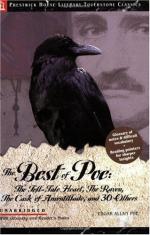The secret of a poem, no less than a jest’s prosperity, lies in the ear of him that hears it. Yield to its spell, accept the poet’s mood: this, after all, is what the sages answer when you ask them of its value. Even though the poet himself, in his other mood, tell you that his art is but sleight of hand, his food enchanter’s food, and offer to show you the trick of it,—believe him not. Wait for his prophetic hour; then give yourself to his passion, his joy or pain. “We are in Love’s hand to-day!” sings Gautier, in Swinburne’s buoyant paraphrase,—and from morn to sunset we are wafted on the violent sea: there is but one love, one May, one flowery strand. Love is eternal, all else unreal and put aside. The vision has an end, the scene changes; but we have gained something, the memory of a charm. As many poets, so many charms. There is the charm of Evanescence, that which lends to supreme beauty and grace an aureole of Pathos. Share with Landor his one “night of memories and of sighs” for Rose Aylmer, and you have this to the full.
And now take the hand of a new-world minstrel, strayed from some proper habitat to that rude and dissonant America which, as Baudelaire saw, “was for Poe only a vast prison through which he ran, hither and thither, with the feverish agitation of a being created to breathe in a purer world,” and where “his interior life, spiritual as a poet, spiritual even as a drunkard, was but one perpetual effort to escape the influence of this antipathetical atmosphere.” Clasp the sensitive hand of a troubled singer dreeing thus his weird, and share with him the clime in which he found,—never throughout the day, always in the night,—if not the Atlantis whence he had wandered, at least a place of refuge from the bounds in which by day he was immured.
To one land only he has power to lead you, and for one night only can you share his dream. A tract of neither Earth nor Heaven: “No-man’s-land,” out of Space, out of Time. Here are the perturbed ones, through whose eyes, like those of the Cenci, the soul finds windows though the mind is dazed; here spirits, groping for the path which leads to Eternity, are halted and delayed. It is the limbo of “planetary souls,” wherein are all moonlight uncertainties, all lost loves and illusions. Here some are fixed in trance, the only respite attainable; others
“move
fantastically
To a discordant melody:”
while everywhere are
“Sheeted Memories of the
Past—
Shrouded forms that start and sigh
As they pass the wanderer by.”
Such is the land, and for one night we enter it,—a night of astral phases and recurrent chimes. Its monodies are twelve poems, whose music strives to change yet ever is the same. One by one they sound, like the chiming of the brazen and ebony clock, in “The Masque of the Red Death,” which made the waltzers pause with “disconcert and tremulousness and meditation,” as often as the hour came round.




